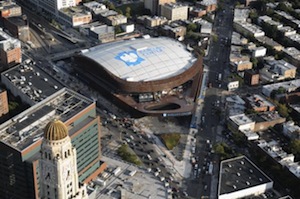Many residents and elected leaders from the neighborhoods near the Barclays Center in Prospect Heights are letting out a sigh of relief after steeling for gridlock this weekend. Sellout crowds for the arena's first events -- three Jay-Z concerts -- did not completely overwhelm nearby neighborhoods with traffic, but the strain on local streets was still clear.

"It wasn't as bad as we expected," Danae Oratowski, chair of the Prospect Heights Neighborhood Development Council, told Streetsblog.
Council Member Letitia James said her office was "pleasantly surprised that we did not receive as many complaints as I had anticipated."
Despite the relative smoothness of the arena's opening, there were rough spots. Early indications show that the share of event-goers taking transit may not be as high as predicted during the arena's planning, while free curbside parking on local streets seems to be irresistible to many drivers looking to avoid paying at parking garages and lots. Sidewalk space fell short of what was needed to handle the number of pedestrians, especially when the concerts let out, which led police to close Atlantic Avenue to vehicles in order to accommodate crowds leaving the arena.
After the concerts ended on Friday and Saturday, NYPD barriers proved to be ineffective crowd control, as sidewalks filled up near the intersection of Flatbush Avenue and Dean Street and along Atlantic Avenue. Presently, there is no crosswalk for people leaving the arena's mid-block Atlantic Avenue exit. "The sidewalks are too small to accommodate the crowd," said James.
Traffic management around the arena was supplemented by additional NYPD personnel for opening weekend. "One of the reasons it worked so well is that there were vast numbers of police officers on the streets," Oratowski said. "I don't know if that's really a sustainable plan for the future."
Not that the traffic management provided by police necessarily improved matters either. NYPD officers waved many drivers through red lights, leading to conflicts with crossing pedestrians and cyclists who had a green light. Safety apparently wasn't the top priority. 78th Precinct Captain Michael Ameri told the Patch, ”I’m in a good mood because traffic is moving well.”
A large portion of concertgoers got to the event by subway. Turnstile exits at the recently rechristened "Atlantic Ave-Barclays Center" station increased 6,754 in the four hours before the show compared to other Fridays in September, according to MTA data analyzed by WNYC. If all of those additional riders were going to the Barclays Center, they would make up approximately one in three concert attendees at the sold-out 19,000-seat arena.
The increase calculated by WNYC does not include people who used other nearby subway stations, buses or LIRR service. The arena's traffic forecast, prepared by Sam Schwartz Engineering, predicted just under half of attendees would arrive by subway, with six in ten arriving on foot or by transit.
Oratowski said that the Jay-Z concerts attracted "a very young crowd" that was more inclined to take transit. "That may not be the case going forward with things like the Barbara Streisand concert, or even a Nets game," she said.
Of concertgoers who drove, few used the arena's parking lot, located between Vanderbilt Avenue and Carlton Avenue. The lot's 541 spaces, which cost approximately $26 each, are limited to cars with three or more passengers. Another 150 free spots are reserved for VIPs. Over the weekend, the lot was barely a quarter full during the concerts, according to separate observations from reporter Norman Oder of Atlantic Yards Report and Council Member Steve Levin.
Most drivers are choosing to park elsewhere. For tonight's concert, charging between $20 and $41 per space, three nearby parking lots are sold out. Five other nearby lots have spaces, as do six remote locations with shuttle service.
Harder to measure is how many people are cruising neighborhood streets searching for free parking for Barclays Center events. "I didn't get a lot of complaints from residents that they didn't have parking available," said James, who, along with Levin, had advocated for a residential parking permit program, before DOT ruled it out.
Black cars and limousines, however, were a noticeable sight on nearby streets during the concerts. For-hire drivers were directed to wait on Fort Greene Place, which quickly reached capacity. "The black cars and the limos are just so apparent that we can easily identify them on residential streets," said Oratowski. "We saw a lot of black cars circling," double-parking, and parking illegally, she said.
Oratowski said the Prospect Heights Neighborhood Development Council is working with Community Board 2 and merchants on Flatbush and Vanderbilt avenues to change meter hours, rates or time limits so parking remains available for business patrons not going to the Barclays Center. "If the community’s interested, we’re happy to work with them," DOT's Chris Hrones said in July. In 2009, DOT implemented its PARK Smart parking meter reforms -- bringing meter prices more in line with demand -- in nearby Park Slope.
DOT is scheduled to meet in November with a quality-of-life task force to assess a wide range of transportation issues after the first weeks of the Barclays Center's operation, according to James.





